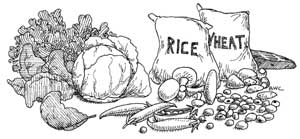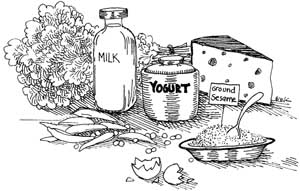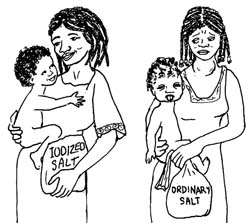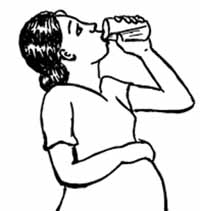14.2.1 The five most important vitamins and minerals
Pregnant and breastfeeding women need more of these five vitamins and minerals than other people do — iron, folic acid, calcium, iodine and vitamin A. They should try to get these vitamins and minerals every day.
Why do you think that a pregnant woman needs more of these vitamins and minerals?
The baby needs them to grow and be healthy and to prevent birth defects. A pregnant woman needs them to have enough energy to look after herself and her family, to fight infections and to keep her strong for completing the pregnancy, giving birth safely and breastfeeding the baby afterwards.
Iron
Iron helps make blood healthy and prevents anaemia (you will learn about diagnosing and treating anaemia in Study Session 18 of this Module). A pregnant woman needs a lot of iron to have enough energy, to prevent too much bleeding at the birth, and to make sure that the growing baby can form healthy blood and store iron for the first few months after birth. It is also important in the production of good breast milk.

These foods contain a lot of iron (Figure 14.3):
- Poultry (chicken)
- Fish
- Sunflower, pumpkin and squash seeds
- Beans, peas and lentils
- Dark leafy green vegetables
- Yams
- Hard squash
- Meat (especially liver, kidney and other organ meats)
- Whole grain products
- Dried fruit
- Nuts
- Iron-fortified bread
- Egg yolk.
Taking iron pills
It can be difficult for a pregnant woman to get enough iron, even if she eats iron-rich foods every day. She should also take iron pills (or liquid iron drops) to prevent anaemia. These medicines may be called ferrous sulfate, ferrous gluconate, ferrous fumerate or other names (ferrous comes from the Latin word for iron).
Iron pills or drops can be obtained from pharmacies and health institutions, but throughout Ethiopia you will give iron pills routinely to pregnant women as part of focused antenatal care. She should receive 300 to 325 mg (milligrams) of ferrous sulphate once a day taken by mouth, preferably with a meal. This dosage is usually supplied in a single tablet combined with folate (see below).
The iron pills may cause nausea, make it hard for the woman to pass stool (constipation), and her stool may turn black, but it is important for the woman to keep taking the iron pills because anaemia can cause complications during pregnancy, during delivery, and after the baby is born. It is helpful for the woman to take the iron pill with a meal, drink plenty of fluids, and eat plenty of fruits and vegetables to avoid nausea and constipation. The black colour of the stool is a normal side-effect from the iron and is not harmful.
Folate (folic acid)
Lack of folate can cause anaemia in the mother and severe birth defects in the baby. To prevent these problems, it is important if possible for a woman to get enough folic acid in her diet before she becomes pregnant and she should certainly do this in the first few months of pregnancy.
Foods rich in folate that pregnant and breastfeeding women should try to eat every day (Figure 14.4) include:

- Dark green, leafy vegetables
- Whole grains (brown rice, whole wheat)
- Meat (especially liver, kidney and other organ meats)
- Fish
- Peas and beans
- Eggs
- Sunflower, pumpkin and squash seeds
- Mushrooms.
As well as eating as many of these foods as she can, all pregnant women should also take 400 mcg (micrograms) of folic acid tablets orally every day during pregnancy. She should be able to get these tablets from you as part of Focused Antenatal Care.
Calcium

A growing baby needs a lot of calcium to make new bones, especially in the last few months of pregnancy. Women need calcium for strong bones and teeth. These foods (Figure 14.5) contain a lot of calcium:
- Yellow vegetables (hard squash, yams)
- Lime (carbon ash)
- Milk, curd, yogurt and cheese
- Green, leafy vegetables
- Bone meal and egg shells
- Molasses and soybeans
- Sardines.
Women can also get more calcium in these ways:
- Soak bones or eggshells in vinegar or lemon juice for a few hours. Then use the liquid to make soup or eat with other foods.
- Add lemon juice, vinegar or tomatoes when cooking bones.
- Grind eggshells into a fine powder and mix into food.
- Soak maize in lime (carbon ash) before cooking it.
Iodine

Iodine prevents goitre (swelling of the neck) and other problems in adults. Lack of iodine in a pregnant woman can cause her child to have cretinism, a disability that affects thinking and physical features.
The easiest way to get enough iodine is to use iodized salt instead of regular salt (Figure 14.6). It is available in packet form labelled ‘Iodized salt’ in many market places.
Vitamin A

Vitamin A prevents poor vision at night or when light intensity is low and helps to fight infections. Lack of vitamin A also causes blindness in children. A woman needs to eat plenty of vitamin A-rich food during pregnancy and while breastfeeding.
Dark yellow and green leafy vegetables and yellow fruits contain lots of vitamin A. Name some of these vegetables and fruits.
Carrots, mangoes, spinach, cabbage. (You may have suggested other good examples.)
Other sources of vitamin A are liver, fish liver oil, milk, eggs and butter.
Fluids

Along with eating healthy foods, women should drink plenty of clean water and other healthy fluids every day. Fruit juices, animal milks and many herbal teas are all healthy fluids to drink.
14.2 Food groups and their nutrients
